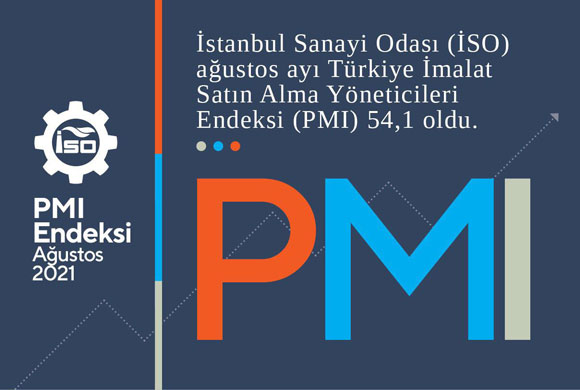News
August 2021 Report of ICI Türkiye Manufacturing PMI and Türkiye Sector PMI Released
- 01.09.2021
- News

The August 2021 period of Istanbul Chamber of Industry (ICI) Türkiye Manufacturing PMI (Purchasing Managers’ Index) survey, which is the fastest and reliable reference accepted in manufacturing industry performance of the economic growth was announced. The headline PMI ticked up to 54.1 in August signalling a solid improvement in the health of the manufacturing sector and one that was the most marked since January. Business conditions have now strengthened in three consecutive months. Improving customer demand and the recent loosening of COVID-19 restrictions meant that new orders continued to rise solidly during August. New export business increased particularly sharply.
According to the ICI Türkiye Manufacturing PMI data of August, nine out of 10 monitored sectors showed an output expansion in August. The strongest expansion was seen in land and sea vehicles manufacturing. The clothing and leather products, textile, machinery and metal products sectors also posted significant improvements. The only sector with a slowdown in output was the non-metallic mineral products sector. Some of the sectors showed strong export performance while there were increases in new orders in most of the sectors.
The August 2021 period of Istanbul Chamber of Industry (ISO) Türkiye Manufacturing PMI (Purchasing Managers’ Index) survey, which is the fastest and reliable reference accepted in manufacturing industry performance of the economic growth was announced. The headline PMI, where any figure greater than 50.0 indicates overall improvement of the sector, ticked up to 54.1 in August from 54.0 in July, signalling a solid improvement in the health of the manufacturing sector and one that was the most marked since January. Business conditions have now strengthened in three consecutive months. Improving customer demand and the recent loosening of COVID-19 restrictions meant that new orders continued to rise solidly during August. New export business increased particularly sharply. Production expanded for the third successive month amid improving customer demand, with the aforementioned growth of new export orders helping to boost output in some cases. The rate of expansion was solid, albeit softer than that seen in July.
Sharper increases in both purchasing activity and employment were recorded as firms attempted to keep on top of workloads. The rise in employment was the fastest since January. Manufacturers were able to prevent a build-up of backlogs of work, which were broadly unchanged for the second month running. Some respondents highlighted the need to expand workforce numbers. Efforts to secure inputs continued to be hampered by supply-chain delays, which contributed to further sharp increases in input costs and output prices. That said, inflationary pressures showed signs of easing during the month. Stocks of both purchases and finished goods rose in August, the first expansions in 12 and 69 months respectively. Firms increased their pre-production inventories in line with higher new orders, and as part of efforts to guard against supply shortages. Meanwhile, difficulties making deliveries to customers were reportedly behind the accumulation of stocks of finished goods.
Commenting on the Istanbul Chamber of Industry Türkiye Manufacturing PMI survey data, Andrew Harker, Economics Director at IHS Markit, said:
“Despite the numerous challenges being faced by manufacturers at present, Turkish firms were able to sustain growth for a third successive month in August as client demand improved, while purchasing and employment were ramped up. Efforts to secure export sales were particularly successful, with international new business up sharply. Manufacturers therefore had to battle with the severe difficulties still afflicting transportation to get their goods out to customers. Firms will be hoping that some of these constraints start to ease over the course of the rest of the year so that their full growth potential can be realised.”
Output expansion in all sectors with the strongest in land and sea vehicles
According to the ICI Türkiye Manufacturing PMI data of August, nine out of 10 monitored sectors showed an output expansion in August. The strongest expansion was seen in land and sea vehicles production. Some of the sectors showed strong export performance while there were increases in new orders in most of the sectors. However, there were some supply-chain delays, which contributed to further sharp increases in input costs and output prices. Besides the land and sea vehicles sector, the clothing and leather products, textile, machinery and metal products sectors also posted significant improvements. The only sector with a slowdown in output was the non-metallic mineral products sector. It has the highest slowdown in new orders in all of the monitored categories. The output decreased for the sixth consecutive months on a monthly basis.
While six sectors posted rise in new orders, the land and sea vehicles sector again had the fastest expansion. Many sectors were supported with the momentum in new export orders. Particularly the textile and food products sectors showed strong export performance. Depending on the improvements in new orders and rise in production requirements, the number of sectors which increased its employment rose to seven after six in July. Increases were seen in purchasing activities in most of the sectors, while only two sectors saw drops in input costs. Manufacturers purchased inputs, but continued to have increased delivery times. The most significant delays were seen in electrical and electronic products and the machinery and metal products sectors. Even though the inflationary pressures showed signs of easing in August, it caused increases in input costs due to supply shortages. The sharpest rise in input prices was in non-metallic mineral products sector. Similarly, the end product prices continued to rise, though limited. The highest rise in sales prices was seen in the textile sector, while the lowest was seen in clothing and leather products sector. Difficulties experienced in the input supply caused drops in input stocks in most of the sectors in August. However, there were some exceptions where there was significant increase in pre-production stocks like in the chemicals, plastics and rubber sector.